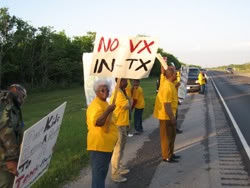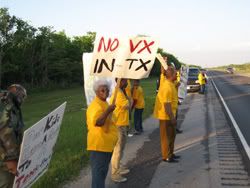Nerve agent byproduct being shipped across the South, sparking environmental justice concerns

 Two senior Army officials admitted in federal court yesterday that the VX nerve agent byproduct being shipped from the Newport Army Deport in Newport, Ind. to Port Arthur, Texas is not considered "destroyed" under the Chemical Weapons Convention, Environment News Service reports:
Two senior Army officials admitted in federal court yesterday that the VX nerve agent byproduct being shipped from the Newport Army Deport in Newport, Ind. to Port Arthur, Texas is not considered "destroyed" under the Chemical Weapons Convention, Environment News Service reports:
Four groups -- the Chemical Weapons Working Group, Sierra Club, Citizens Against Incineration at Newport, and the Community In Power Development Association in Port Arthur -- filed suit against the Army and its incineration contractor Veolia Environmental Services.
They allege that the transportation and incineration of the VX liquid byproduct, called hydrolysate, are putting communities at risk.
Judge Larry McKinney, chief federal district judge for the Southern District of Indiana, is hearing testimony on a motion for an injuction to halt shipments of the byproduct through eight states. Shipments are suspended until the judge rules.
The toxic by-product at issue is VX hydrolysate, caustic wastewater created when VX nerve agent is mixed with sodium hydroxide and water at the Newport Depot in an attempt to destroy the VX in accordance with the treaty.
"Until this material is destroyed under the treaty definition, it is considered a declared chemical weapon," said Craig Williams, director of the Chemical Weapons Working Group.
The states along the transport route include Arkansas, Tennessee, Mississippi, Louisiana and Texas.
In April, the Army signed a contract to burn the material at the Veolia incinerator in the predominantly African-American community of Port Arthur after shipments were rejected by Ohio and New Jersey.
Earlier this month, the grassroots Community In-Power Development Association of Port Arthur delivered petitions to U.S. Rep. Ted Poe (R-Texas) calling for a permanent end to the shipments and incineration. In May, the association also delivered a citizens' letter to Sen. John Cornyn (R-Texas) seeking his help in stopping the transports. The group is calling for treating the material on site in Indiana.
For more on the shipments and lawsuit, visit CWWG's Web site here.
(Photo from the Chemical Weapons Working Group Web site.)
Tags
Sue Sturgis
Sue is the former editorial director of Facing South and the Institute for Southern Studies.
